-
 Snoflo Premium
Snoflo Premium
Get unlimited access to all our content
With no Ad interruptions! - Start Your Free Trial Login with existing account
Savannah
Eden Index
Climate
8.0
•
Recreation
6.9
•
Community
2.0
•
Safeguard
6.1/10

Savannah, Georgia is a charming city located on the eastern coast of the state. Known for its rich history, antebellum architecture, and southern hospitality, Savannah offers a diverse range of outdoor recreation opportunities amidst its pleasant climate and stunning natural surroundings.
The climate in Savannah is characterized as humid subtropical, with hot and humid summers and mild winters. Average temperatures range from the 60s°F (15-20°C) in winter to the 90s°F (30-35°C) in summer. The city receives ample rainfall throughout the year, contributing to its lush landscapes and vibrant flora.
Savannah is blessed with a hydrological network that includes the Savannah River and numerous tributaries, creating opportunities for water-based activities. Fishing enthusiasts can catch a variety of species in these waters, including bass, catfish, and trout. Additionally, the marshes and swamps surrounding Savannah provide excellent opportunities for kayaking, canoeing, and birdwatching.
With its abundance of parks, nature reserves, and nearby islands, Savannah offers a plethora of outdoor activities. From strolling through the iconic Forsyth Park to exploring the picturesque Wormsloe Historic Site, there is a wealth of historical and natural sites to explore. Outdoor enthusiasts can also enjoy hiking and biking along the scenic trails of Skidaway Island State Park, spotting wildlife and taking in breathtaking views.
In conclusion, Savannah, Georgia boasts a delightful climate, abundant water resources, and numerous outdoor recreation opportunities. Whether you are interested in historical exploration, water-based activities, or simply enjoying the natural beauty, Savannah has something to offer for everyone seeking an outdoor adventure.
What is the Eden Index?
The Snoflo Eden Index serves as a comprehensive rating system for regions, evaluating their desirability through a holistic assessment of climate health, outdoor recreation opportunities, and natural disaster risk, acknowledging the profound impact of these factors on livability and well-being.
Climate Health Indicator (CHI): 8.0
Savannah receives approximately
1237mm of rain per year,
with humidity levels near 86%
and air temperatures averaging around
19°C.
Savannah has a plant hardyness factor of
8, meaning
plants and agriculture in this region tend to thrive here all year round.
By considering the ideal temperature range, reliable water supplies, clean air, and stable seasonal rain or snowpacks, the Climate Health Indicator (CHI) underscores the significance of a healthy climate as the foundation for quality living.
A healthy climate is paramount for ensuring a high quality of life and livability in a region, fostering both physical well-being and environmental harmony. This can be characterized by ideal temperatures, reliable access to water supplies, clean air, and consistent seasonal rain or snowpacks.
Weather Forecast
Streamflow Conditions
Savannah
Area Rivers
Savannah
Snowpack Depths
Savannah
Reservoir Storage Capacity
Savannah
Groundwater Levels
Recreational Opportunity Index (ROI): 6.9
The Recreational Opportunity Index (ROI) recognizes the value of outdoor recreational options, such as parks, hiking trails, camping sites, and fishing spots, while acknowledging that climate plays a pivotal role in ensuring the comfort and consistency of these experiences.
Access to outdoor recreational opportunities, encompassing activities such as parks, hiking, camping, and fishing, is crucial for overall well-being, and the climate plays a pivotal role in enabling and enhancing these experiences, ensuring that individuals can engage in nature-based activities comfortably and consistently.
Camping Areas
| Campground | Campsites | Reservations | Toilets | Showers | Elevation |
|---|---|---|---|---|---|
| Barnwell State Park | 30 | 262 ft | |||
| Skidaway Island State Park | None | 18 ft | |||
| Fort McAllister State Park | None | 11 ft | |||
| Lotts Island Army Airfield RV Military - Hunter AAF | None | 6 ft |
Nearby Fishing
Nearby Ski Areas
Catastrophe Safeguard Index (CSI):
The Catastrophe Safeguard Index (CSI) recognizes that natural disaster risk, encompassing floods, fires, hurricanes, and tornadoes, can drastically affect safety and the overall appeal of an area.
The level of natural disaster risk in a region significantly affects safety and the overall livability, with climate change amplifying these risks by potentially increasing the frequency and intensity of events like floods, fires, hurricanes, and tornadoes, thereby posing substantial challenges to community resilience and well-being.
Community Resilience Indicator (CRI): 2.0
The Community Resilience Indicator (CRI) recognizes that education, healthcare, and socioeconomics are crucial to the well-being of a region. The CRI acknowledges the profound impact of these elements on residents' overall quality of life. By evaluating educational resources, healthcare accessibility, and economic inclusivity, the index captures the essential aspects that contribute to a thriving community, fostering resident satisfaction, equity, and social cohesion.

